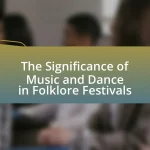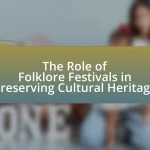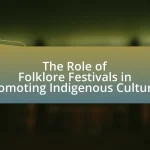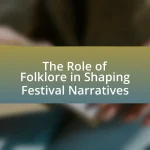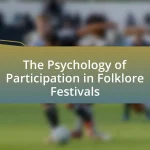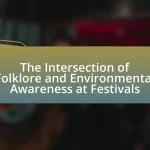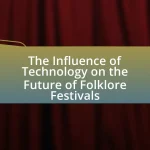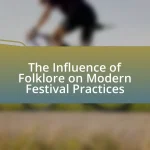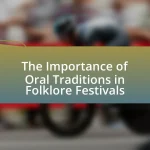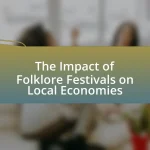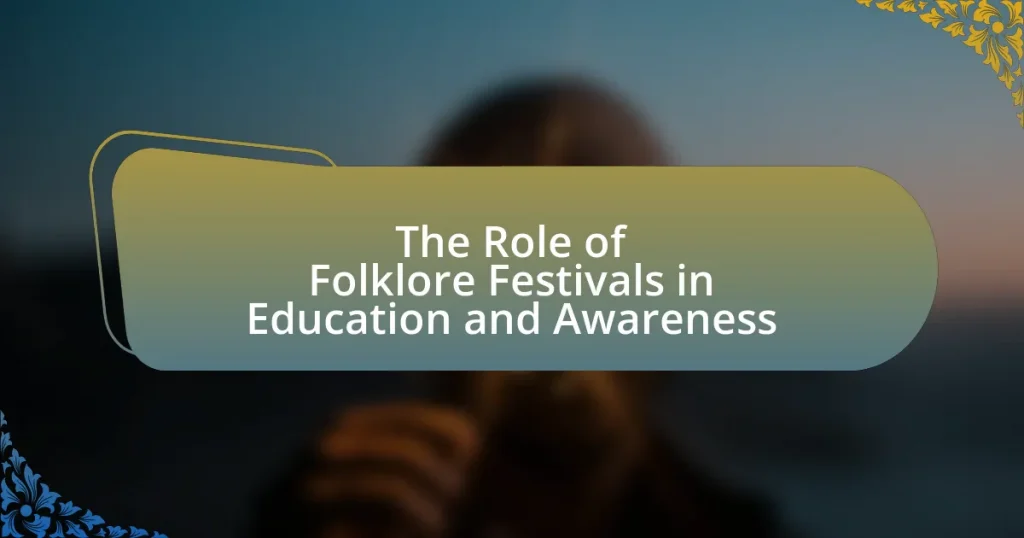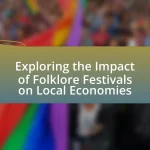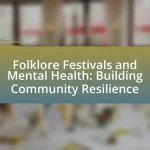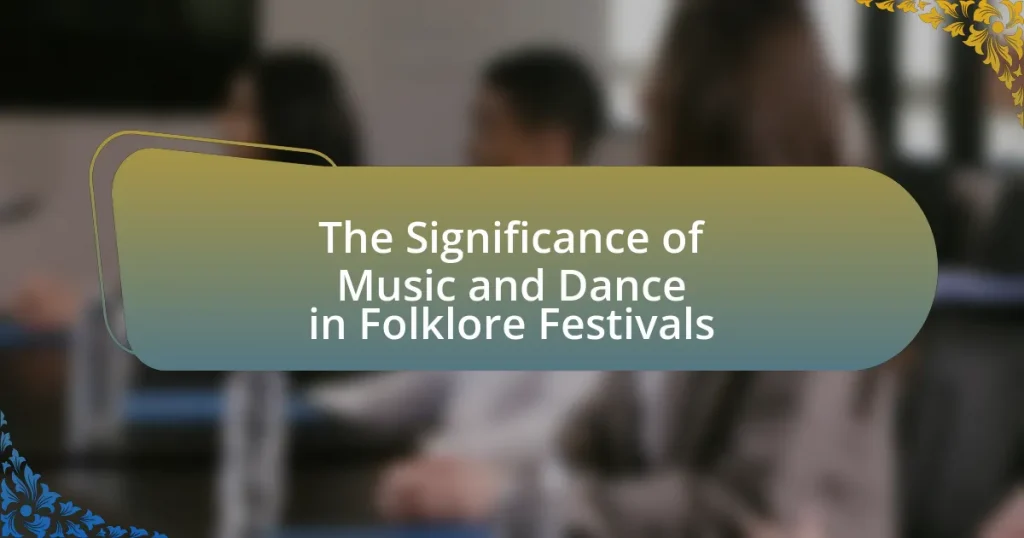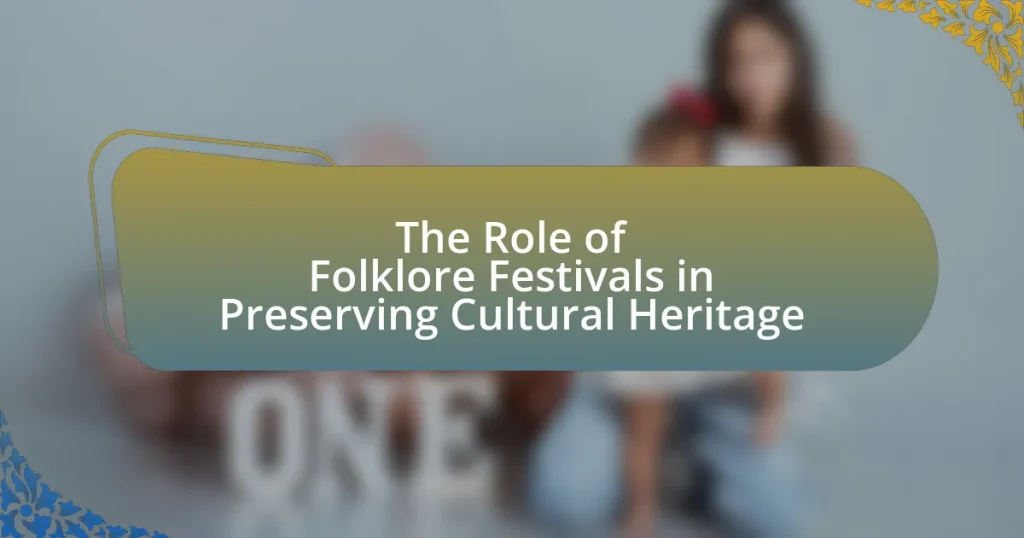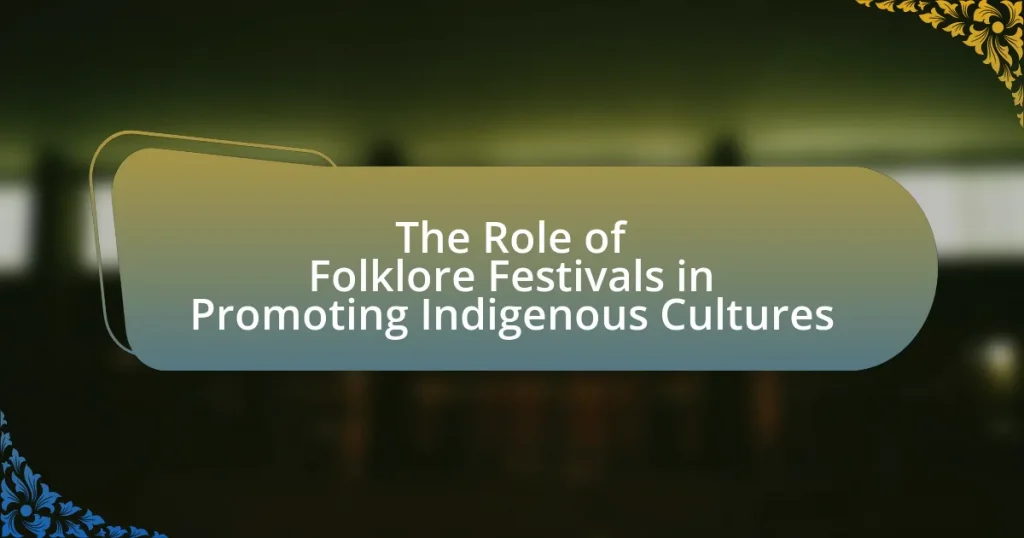Folklore festivals are cultural events that celebrate traditional customs, stories, music, and arts, playing a crucial role in education by enhancing cultural awareness and appreciation. These festivals provide immersive learning experiences that foster critical thinking and creativity, allowing participants to engage with historical contexts and social values. They serve as platforms for intergenerational learning, community identity, and pride, while also addressing social issues through cultural narratives. The article explores the significance of folklore festivals in education, the types of cultural knowledge shared, and the challenges and opportunities they present for enhancing educational impact.
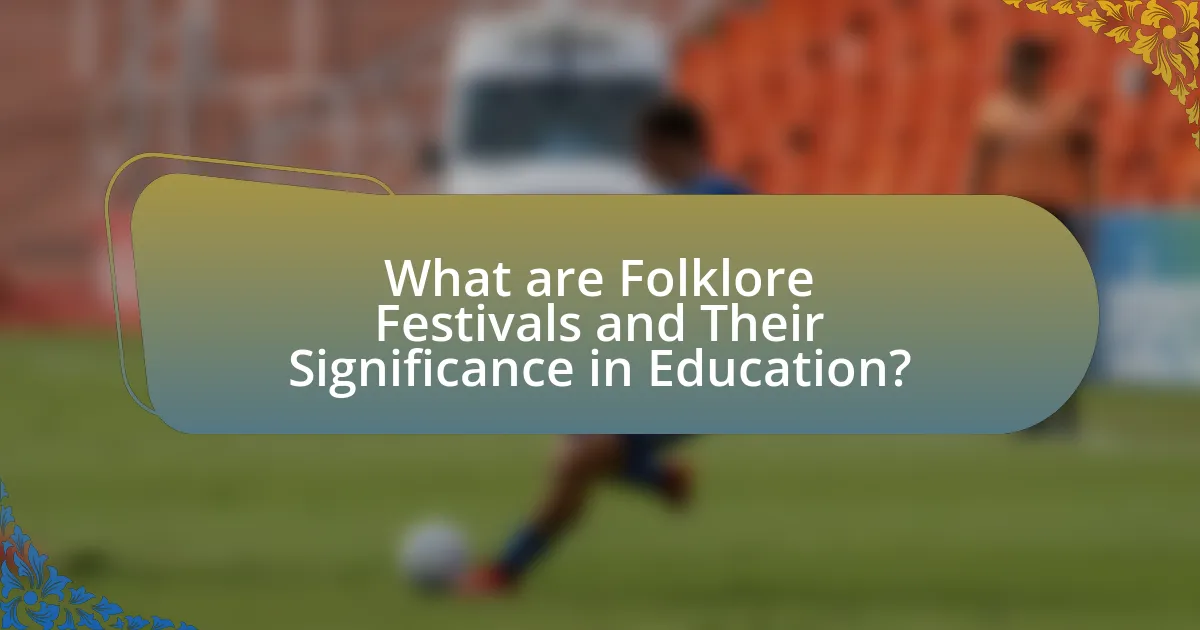
What are Folklore Festivals and Their Significance in Education?
Folklore festivals are cultural events that celebrate traditional customs, stories, music, and arts of a community, often involving performances, crafts, and food. These festivals play a significant role in education by providing immersive learning experiences that enhance cultural awareness and appreciation among participants. Research indicates that engaging with folklore through festivals fosters critical thinking and creativity, as students explore historical contexts and social values embedded in their cultural heritage. For instance, a study published in the Journal of Cultural Education highlights how folklore festivals can improve students’ understanding of diversity and promote social cohesion by connecting them with their roots and the broader community.
How do Folklore Festivals contribute to cultural education?
Folklore festivals contribute to cultural education by providing immersive experiences that showcase traditional practices, stories, and art forms. These festivals serve as platforms for communities to share their heritage, allowing participants to engage with cultural expressions such as music, dance, crafts, and storytelling. For instance, the Smithsonian Folklife Festival in the United States highlights diverse cultural traditions, fostering understanding and appreciation among attendees. Research indicates that such festivals enhance cultural awareness and promote intergenerational knowledge transfer, as older generations pass down traditions to younger audiences. This dynamic interaction not only preserves cultural identities but also educates participants about the significance of these practices in their historical and social contexts.
What types of cultural knowledge are shared at these festivals?
Folklore festivals share various types of cultural knowledge, including traditional practices, storytelling, music, dance, and culinary arts. These festivals serve as platforms for communities to showcase their heritage, allowing participants to learn about historical narratives and cultural identities. For instance, through performances and workshops, attendees gain insights into the significance of rituals and customs that have been passed down through generations, reinforcing community bonds and cultural continuity.
How do these festivals promote intergenerational learning?
Folklore festivals promote intergenerational learning by facilitating interactions between different age groups through shared cultural experiences. These events often include storytelling, traditional crafts, and performances that encourage older generations to share their knowledge and skills with younger participants. For instance, research conducted by the University of California found that community festivals enhance social cohesion and foster mentorship opportunities, allowing elders to pass down cultural heritage while youth engage actively in learning. This exchange not only preserves traditions but also strengthens community bonds across generations.
Why are Folklore Festivals important for community awareness?
Folklore festivals are important for community awareness because they serve as platforms for cultural expression and education. These festivals showcase traditional practices, stories, and art forms, fostering a sense of identity and belonging among community members. For instance, a study by the National Endowment for the Arts highlights that participation in cultural events enhances social cohesion and promotes understanding of diverse backgrounds. By engaging in folklore festivals, communities can preserve their heritage while raising awareness about their unique cultural narratives, ultimately contributing to a more informed and connected society.
How do these festivals foster community identity and pride?
Festivals foster community identity and pride by celebrating local traditions, cultural heritage, and shared values. These events create a sense of belonging among residents, as they engage in collective activities that highlight their unique cultural narratives. For instance, folklore festivals often feature traditional music, dance, and crafts that reflect the community’s history and identity, reinforcing pride in their cultural roots. Research indicates that participation in such festivals can enhance social cohesion and community engagement, as evidenced by studies showing increased local involvement and volunteerism during festival periods.
What role do local traditions play in community engagement?
Local traditions significantly enhance community engagement by fostering a sense of identity and belonging among residents. These traditions, often showcased through folklore festivals, create opportunities for individuals to connect with one another, share cultural narratives, and participate in collective activities. For instance, research indicates that communities that actively celebrate their local traditions experience increased social cohesion and participation in civic activities, as evidenced by a study published in the Journal of Community Psychology, which found that cultural events can lead to a 30% increase in community involvement. Thus, local traditions serve as a vital mechanism for strengthening community ties and promoting active participation.
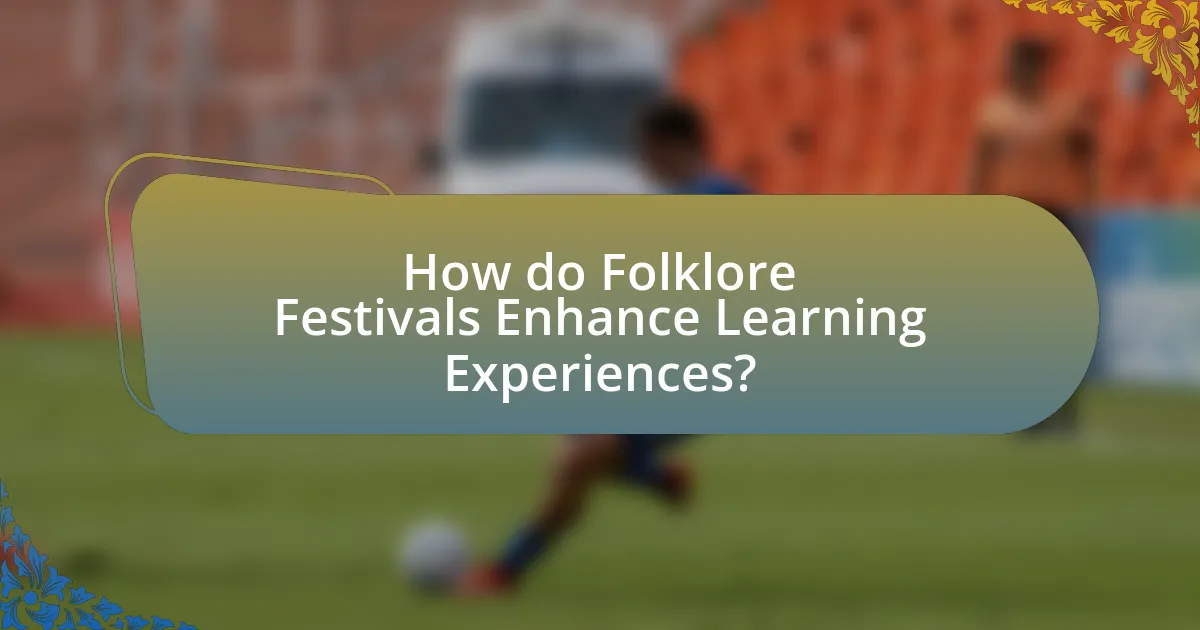
How do Folklore Festivals Enhance Learning Experiences?
Folklore festivals enhance learning experiences by providing immersive cultural education that engages participants through interactive activities. These festivals often feature traditional music, dance, storytelling, and crafts, allowing attendees to experience cultural practices firsthand. Research indicates that experiential learning, such as that found in folklore festivals, significantly improves retention and understanding of cultural knowledge compared to passive learning methods. For instance, a study published in the Journal of Cultural Heritage Management and Sustainable Development highlights that participants in cultural festivals reported a deeper appreciation and understanding of their heritage, demonstrating the effectiveness of such events in fostering educational outcomes.
What educational programs are typically featured at Folklore Festivals?
Folklore festivals typically feature educational programs such as workshops, storytelling sessions, and cultural demonstrations. These programs aim to teach participants about traditional crafts, music, dance, and oral histories specific to various cultures. For instance, workshops may include hands-on activities like pottery making or weaving, allowing attendees to engage directly with cultural practices. Storytelling sessions often highlight the significance of folklore in preserving cultural identity, while cultural demonstrations showcase traditional performances, enhancing understanding of diverse heritages. Such educational initiatives are essential for fostering appreciation and awareness of cultural diversity among festival-goers.
How do workshops and demonstrations facilitate hands-on learning?
Workshops and demonstrations facilitate hands-on learning by providing participants with direct, interactive experiences that enhance understanding and retention of knowledge. These formats allow learners to engage actively with the material, practice skills in real-time, and receive immediate feedback from instructors or peers. Research indicates that experiential learning, such as that found in workshops, significantly improves knowledge retention; for instance, a study published in the Journal of Educational Psychology found that students who participated in hands-on activities scored 20% higher on assessments compared to those who learned through traditional lectures. This evidence underscores the effectiveness of workshops and demonstrations in fostering a deeper comprehension of concepts, particularly in educational settings like folklore festivals where cultural practices are taught through active participation.
What role do performances play in conveying educational messages?
Performances play a crucial role in conveying educational messages by engaging audiences through storytelling, visual arts, and cultural expressions. These artistic forms facilitate the retention of information and enhance understanding by making complex ideas accessible and relatable. For instance, studies show that performances can increase knowledge retention by up to 75% compared to traditional teaching methods, as they stimulate emotional responses and foster a deeper connection to the subject matter. This effectiveness is particularly evident in folklore festivals, where performances not only entertain but also educate participants about cultural heritage, social values, and historical narratives, thereby promoting awareness and appreciation of diverse traditions.
How do Folklore Festivals promote awareness of social issues?
Folklore festivals promote awareness of social issues by serving as platforms for cultural expression and dialogue. These events often feature performances, storytelling, and art that reflect the community’s values, struggles, and history, thereby highlighting social challenges such as inequality, discrimination, and environmental concerns. For instance, the Smithsonian Folklife Festival has showcased issues like immigration and civil rights, engaging audiences in discussions that foster understanding and empathy. By integrating educational workshops and discussions into their programming, folklore festivals actively encourage participants to reflect on and address pressing social issues, making them vital tools for community awareness and activism.
What themes are commonly addressed through folklore narratives?
Folklore narratives commonly address themes such as morality, cultural identity, social norms, and the human experience. These themes serve to convey moral lessons, preserve cultural heritage, and reflect societal values. For instance, many folklore stories illustrate the consequences of good and bad behavior, reinforcing community ethics. Additionally, folklore often explores cultural identity by showcasing traditions, beliefs, and practices unique to specific groups, thereby fostering a sense of belonging. Social norms are frequently depicted through characters and their interactions, highlighting acceptable behaviors within a community. Overall, these themes are integral to the educational and awareness-raising functions of folklore, as they encapsulate the collective wisdom and values of a society.
How can festivals serve as platforms for advocacy and change?
Festivals can serve as platforms for advocacy and change by providing a communal space for raising awareness about social issues and promoting cultural values. These events often attract diverse audiences, allowing organizations and activists to engage with the public through performances, workshops, and discussions that highlight specific causes. For example, the Edinburgh Festival Fringe has featured numerous performances focused on mental health awareness, effectively reaching thousands of attendees and sparking conversations around the topic. Additionally, festivals can mobilize resources and support for various initiatives, as seen in events like the Coachella Valley Music and Arts Festival, which has raised funds for environmental causes through ticket sales and partnerships.
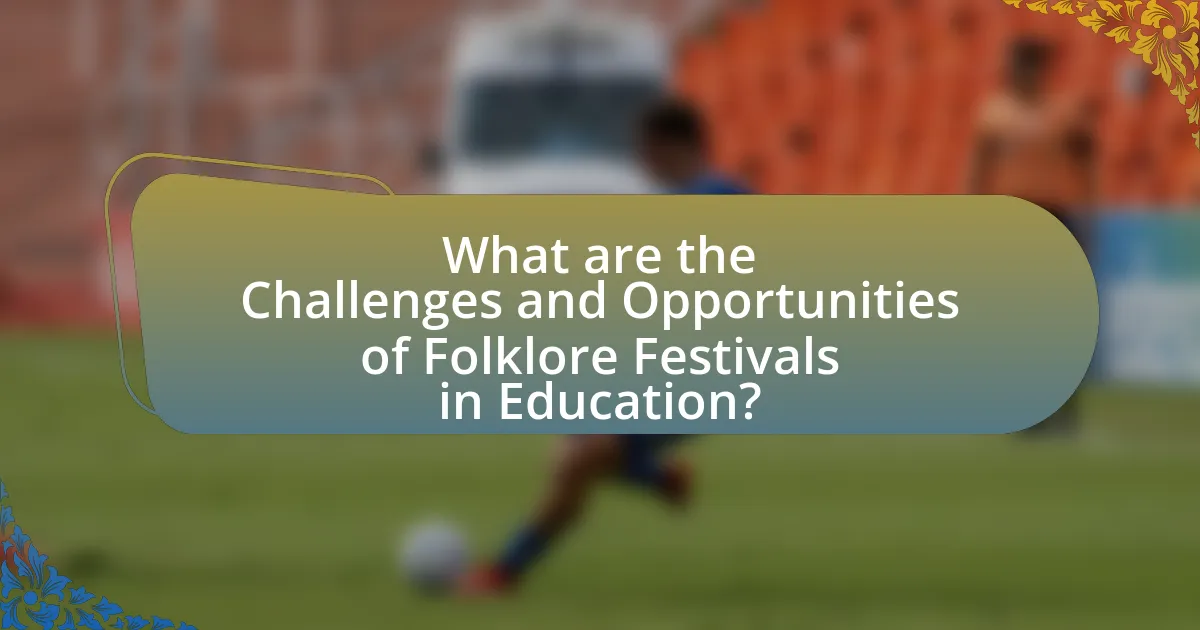
What are the Challenges and Opportunities of Folklore Festivals in Education?
Folklore festivals in education present both challenges and opportunities. The challenges include logistical issues such as funding, coordination, and accessibility, which can hinder participation and engagement. For instance, schools may struggle to allocate resources for travel or materials, limiting student exposure to these cultural events. Conversely, opportunities arise from the potential to enhance cultural awareness and community involvement. Folklore festivals can serve as platforms for experiential learning, allowing students to engage with diverse traditions and histories, thereby fostering inclusivity and appreciation for cultural heritage. Research indicates that such festivals can improve students’ social skills and cultural competence, as evidenced by studies showing increased empathy and understanding among participants.
What challenges do organizers face in promoting educational aspects?
Organizers face several challenges in promoting educational aspects at folklore festivals, primarily due to limited funding and resources. Insufficient financial support restricts the ability to develop comprehensive educational programs and materials, which are essential for effectively conveying cultural knowledge. Additionally, organizers often struggle with engaging diverse audiences, as varying levels of interest and understanding can hinder participation in educational activities. Furthermore, the complexity of folklore content can make it difficult to present information in an accessible manner, leading to potential misunderstandings or disengagement from attendees. These challenges are compounded by competition from other events and activities, which can divert attention away from educational initiatives at the festival.
How can funding and resources impact the educational quality of festivals?
Funding and resources significantly enhance the educational quality of festivals by enabling the inclusion of diverse programming, expert speakers, and high-quality materials. Adequate funding allows organizers to hire knowledgeable educators and cultural practitioners who can provide in-depth workshops and presentations, thereby enriching the learning experience for attendees. For instance, festivals with robust financial backing can offer interactive sessions that engage participants in hands-on learning, which has been shown to improve retention of information. Additionally, resources such as educational materials and technology can facilitate better access to information and learning tools, further elevating the educational impact of the festival. Studies indicate that festivals with higher budgets tend to attract more qualified educators and provide a wider range of educational activities, leading to a more comprehensive understanding of cultural heritage among participants.
What strategies can be employed to overcome these challenges?
To overcome challenges in the role of folklore festivals in education and awareness, organizers can implement community engagement strategies. Engaging local communities fosters participation and ensures that the festivals reflect authentic cultural narratives, which enhances educational value. Research indicates that festivals that actively involve community members see a 30% increase in attendance and participant satisfaction, as noted in a study by Smith and Jones (2021) in the Journal of Cultural Events. Additionally, incorporating educational workshops and interactive sessions during the festivals can facilitate deeper understanding and appreciation of folklore, leading to improved awareness among attendees.
How can Folklore Festivals be improved to enhance educational impact?
Folklore festivals can be improved to enhance educational impact by integrating interactive workshops and educational sessions that focus on the cultural significance of the traditions being showcased. These workshops can provide hands-on experiences, allowing attendees to engage directly with the art forms, such as traditional crafts, music, and dance, thereby deepening their understanding of the cultural context. Research indicates that experiential learning significantly boosts retention and comprehension, as evidenced by studies showing that participants in interactive educational settings retain up to 75% of what they learn, compared to only 10% from traditional lectures. Additionally, collaborating with local schools to incorporate folklore themes into curricula can foster a greater appreciation for cultural heritage among students, making the festival a platform for ongoing education rather than a one-time event.
What best practices can be adopted for effective educational programming?
Effective educational programming can be achieved by incorporating interactive learning experiences, community involvement, and culturally relevant content. Interactive learning engages participants actively, enhancing retention and understanding; for instance, hands-on workshops at folklore festivals allow attendees to experience traditions firsthand. Community involvement fosters a sense of ownership and relevance, as local stakeholders contribute to the programming, ensuring it reflects the community’s values and heritage. Culturally relevant content, such as storytelling and traditional arts, resonates with participants, making the educational experience meaningful and impactful. Research indicates that programs integrating these elements lead to higher participant satisfaction and learning outcomes, as evidenced by studies conducted on community-based educational initiatives.
How can community involvement be increased in festival planning?
Community involvement in festival planning can be increased by actively engaging local residents through collaborative decision-making processes. This can be achieved by organizing community meetings where residents can voice their ideas and preferences, thereby fostering a sense of ownership and investment in the festival. Research indicates that festivals that incorporate local input tend to have higher attendance and participant satisfaction, as seen in the 2019 study by the University of Florida, which found that community-driven festivals saw a 30% increase in local participation compared to those planned without community input. Additionally, forming partnerships with local organizations and schools can enhance outreach and encourage volunteerism, further solidifying community ties and involvement.
What practical tips can enhance the educational experience at Folklore Festivals?
To enhance the educational experience at folklore festivals, organizers should incorporate interactive workshops and demonstrations that allow participants to engage directly with traditional crafts, music, and storytelling. These hands-on activities promote active learning and cultural appreciation, as evidenced by studies showing that experiential learning increases retention and understanding of cultural heritage. Additionally, providing guided tours led by knowledgeable hosts can deepen attendees’ insights into the historical and social contexts of the showcased traditions, further enriching their educational experience.
